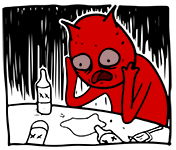- Joined
- Jan 28, 2011
- Messages
- 100,044















Tags: Arcanum: of Steamworks and Magick Obscura; Fallout; Obsidian Entertainment; Temple of Elemental Evil; Tim Cain
Chris Avellone and Tim Cain are in Croatia this weekend for the annual Reboot Develop conference, which has apparently become a popular game developer getaway. Unlike last year's conference, this year some of the events are being streamed live on Twitch. The two panels that Chris and Tim participated on Thursday and yesterday, which were about Fallout and worldbuilding respectively, were not livestreamed. But Tim's talk today, which was titled "Building a Better RPG: Seven Mistakes to Avoid", was.
Tim begins the talk with a short overview of his career, leading up to his current mystery project at Obsidian, which he says is a new IP which Fallout fans will enjoy, and which has a lot of "Fallout and Arcanum style and humor". And that sets the tone for the rest of the talk, which in my opinion isn't so much about particular RPG development mistakes as it is a treatise about various aspects of RPG design. It's likely that many of these design philosophies will find their way into Tim's game, so I'll go over them in detail:
Chris Avellone and Tim Cain are in Croatia this weekend for the annual Reboot Develop conference, which has apparently become a popular game developer getaway. Unlike last year's conference, this year some of the events are being streamed live on Twitch. The two panels that Chris and Tim participated on Thursday and yesterday, which were about Fallout and worldbuilding respectively, were not livestreamed. But Tim's talk today, which was titled "Building a Better RPG: Seven Mistakes to Avoid", was.
Tim begins the talk with a short overview of his career, leading up to his current mystery project at Obsidian, which he says is a new IP which Fallout fans will enjoy, and which has a lot of "Fallout and Arcanum style and humor". And that sets the tone for the rest of the talk, which in my opinion isn't so much about particular RPG development mistakes as it is a treatise about various aspects of RPG design. It's likely that many of these design philosophies will find their way into Tim's game, so I'll go over them in detail:
- Mistake #1 - Steep Learning Curves: Tim thinks character creation in Fallout, Arcanum and other RPGs was too complex. He's experimenting with creating a completely numberless character system that uses geometric shapes to visualize attributes.
- Mistake #2 - Letting Math Trump Psychology: Revealing the influence of the years he spent developing Wildstar, Tim wants to develop mechanics that are psychologically satisfying and addictive, even at the expense of mathematical elegance. For example, he says the player's first attack against an enemy should always hit even if his overall hit percentage is the same regardless, and that rather than allow players to increase their critical hit chance, they should only be allowed to increase their critical hit damage.
- Mistake #3 - Conflating Player Skill With Character Skill: This one will be familiar if you've watched some of Josh Sawyer's talks. Aiming and hitting in an action-RPG should not be determined by character stats. On the other hand, things like the impact of recoil can be affected by stats, as well as the aforementioned critical hit damage.
- Mistake #4 - Misunderstanding Randomness: Here Tim lays out his frustration with the sorts of people who can't believe they could miss a 95% chance-to-hit attack three times in a row. His conclusion is that when people talk about "randomness", they often mean selecting a token rather than rolling a dice (ie, events can't repeat themselves).
- Mistake #5 - Forcing Linearity: This one is pretty self-explanatory. Tim says games are not movies, using Fallout's Tandi rescue scenario with its multiple solutions as an example of the sort of non-linearity he prizes.
- Mistake #6 - Being Non-Reactive: Tim seems particularly interested in the sort of reactivity where characters in the world have different dispositions based on your character's background, clothing and attributes, as seen in Arcanum. He also loves having different end slides based on the player's choices in the game, using Temple of Elemental Evil's evil ending as an example.
- Mistake #7 - Telling Horrible Stories: Tim uses this to emphasize again that games are not movies. Not every character in a game has to be important or advance the plot. Tropes likes the Chosen One protagonist and amnesiac protagonist are tiresome and should be discarded.

























